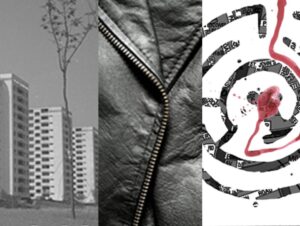Mat Riches reviews Variety Turns by Christopher Arksey (Broken Sleep Books, 2024)
There can’t be many of us not touched by grief these days. This pamphlet is a collection of elegies for Christopher Arksey’s mother, who passed away from cancer in 2016 – it’s a gentle but thorough exploration of grief. Arksey is aware of the difficulties inherent in dealing with such an emotive subject. His short poem ‘Grief’ opens with the word “Indescribable”, then goes on to try to describe it:
The best I can offer:
a permanent resident,
neither seen nor heard,
though their presence
is felt everywhere.
Personally, I think Broken Sleep missed a trick not having that on the back of the book – it’s as convincing a description of the experience of bereavement as any I’ve read. The phrase “neither seen nor heard” is also a nice nod to other poems in the book. ‘Tough Guy’, for example, is about a cross country run and obstacle course known as “the toughest race in the world”. It describes the endurance of Arksey’s mother while taking part, but the poet only knows what happened through studying camcorder footage:
trying to pick you out of the muddied
jostle but finding you uncaptured,
just out of shot.
I’d love to quote the whole poem here, not least for the hard ‘d’ sounds (“vaulted”, “thawed”, “barbed”) that close every line, but more because it’s also a wonderful example of the forensic level of detail this poet uses. He describes the way the mud of the race course gets everywhere, how it “filled / your nostrils, ears and fingernails, blathered / your numbered white T-shirt, and printed / a hand on the cup of tea that steamed / the lens and scorched your lip at the race’s end.” After the race, to be injured by the steam from a cup of tea is both comical and soul-destroying.
Arksey makes use of comedy throughout the book, via routes both subtle and obvious. In ‘Vigil’, his mother farts, perhaps to remind the family that she’s “still breathing”. What was slightly funny at the time has become more so as the years, “in their infinite mercy, / have amplified its comedy.” In ‘The Laugh’ – a Friday Poem in November 2022, read it here – we hear about his mother’s laugh, which is “the laugh of someone twice / your size – with such potency it rocked your frame”. The poem ends: “Only this soundless record of it exists. / And I forget the joke, but I’ve got the gist.” That’s a beautiful rhyme to close on, and it’s neat that the poem is the “soundless record”. Arksey can be playful and comedic but his project is a serious one, and these poems are evocative and finely made.
Arksey can be playful and comedic but his project is a serious one, and these poems are evocative and finely made
Speaking of making things, whenever I cook something that requires a bay leaf, I puzzle about the way it never seems to add anything, although the meal without it is nowhere near as good. While reading Variety Turns I was reminded of this. Why? Because bay trees keep popping up. I counted at least four references, and all of them earn their place. The most poignant is in ‘Amateur Gardener’ which opens:
It’s foolish of me
but I’m keeping you alive as the bay tree.
I have you standing guard
in the sheltered front garden
The poem describes the speaker’s burgeoning gardening skills and how these relate to the need to hold things together. A psychologist or grief counsellor might have a field day with the line “watering till you bubble and overflow”, but I know exactly what Arksey means, and it’s spot on. The poem ends with touching self-awareness: “Ridiculous, I know”, and there are other points where he is similarly knowing and self-deprecating: “It’s foolish of me”, he says, “a fool’s experiment”. Even more powerfully, in ‘Grief’ he speaks about “Failing in my usual / way of stumped silence / or inarticulate babble.” Readers will sense that there’s still regret and anger. Grief is a long process, and not always a linear one.
Elegiac poetry is often hard to read, partly because of the subject matter but also because it’s hard to get inside someone else’s grief and loss. However, Arksey communicates raw emotion with skill and humanity. These poems are controlled, expressive and affecting. Some describe Arksey’s mother in the past tense, but she’s nevertheless very much alive throughout. It’s a lovely tribute to her.
Mat Riches is ITV’s unofficial poet-in-residence. His work’s been in a number of journals and magazines, most recently Wild Court, The High Window and Finished Creatures. He co-runs the Rogue Strands poetry evenings, and reviews for The High Window and London Grip. His pamphlet, Collecting the Data, was published by Red Squirrel Press in 2023. Mat Riches’ blog Wear the Fox Hat is here.

